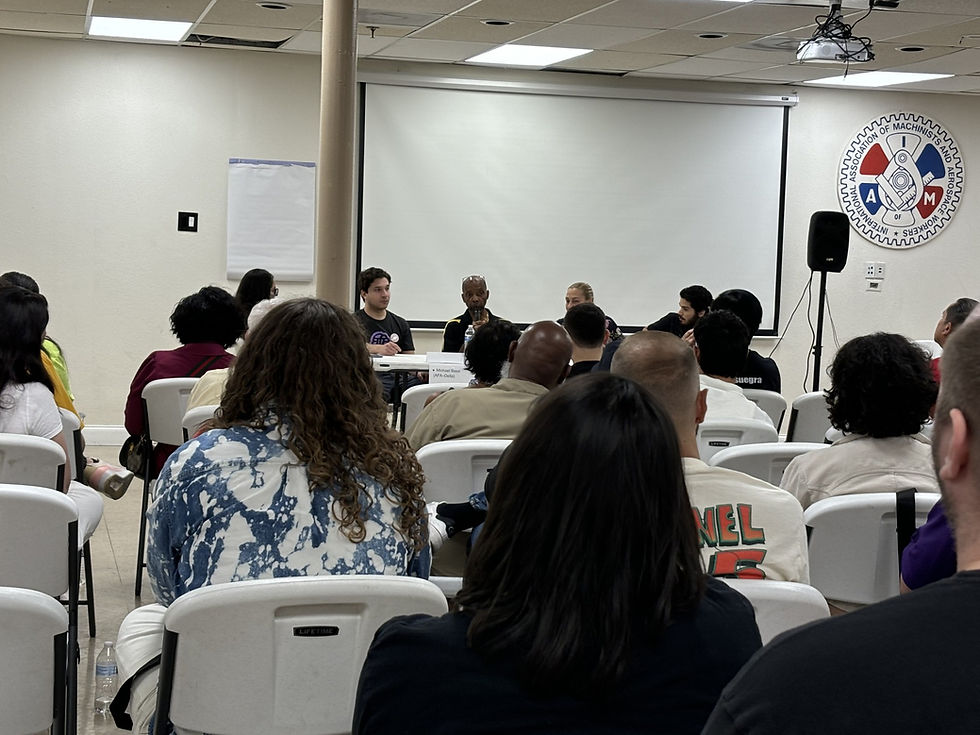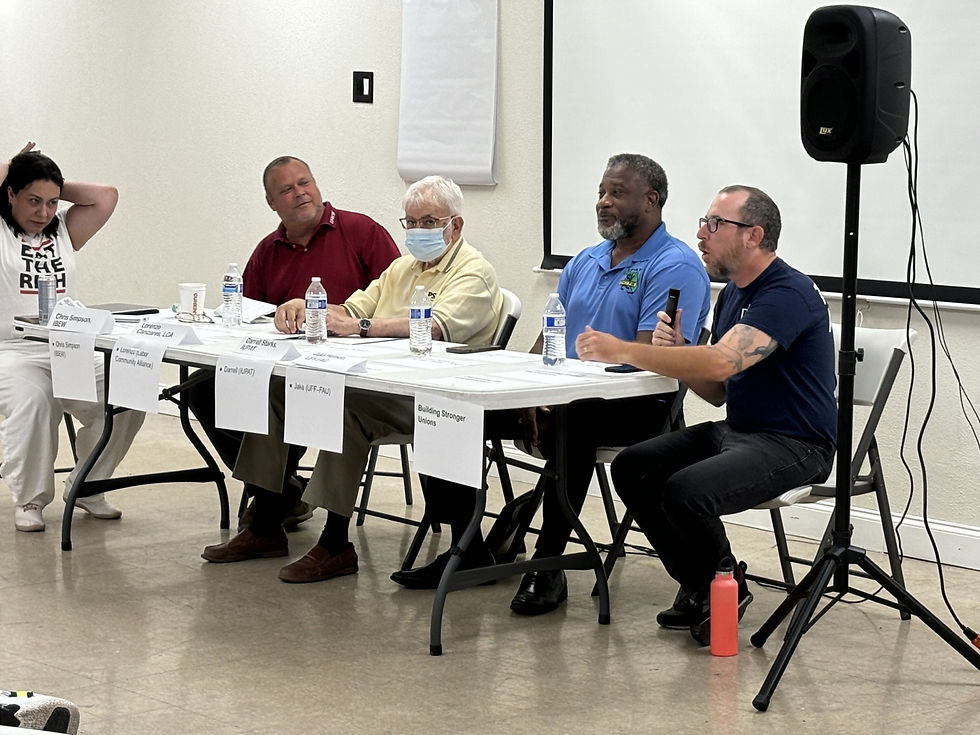Dispatch #5: Education is Labor
- rowbey
- Jun 2, 2025
- 8 min read
Updated: Jun 5, 2025
June 2, 2025


Greetings from the Swamp.
We face unprecedented attacks against workers at all levels as waves of reactionary populist attacks have swept the globe and the United States over the last few years. Workers across the country confront anti-union legislation that makes it difficult to organize and maintain a union. Florida, for example, has enacted laws in 2023 that required unions to have 60% membership or undergo a cumbersome recertification process and that eliminated employer payroll deductions, which forced every union to re-sign-up all of its previous members. The Trump administration is attempting to strip much of the federal workforce of collective bargaining rights and to dismantle the National Labor Relations Board and the Federal Mediation and Conciliation Services, two independent entities that protect workers' rights and keep partisan politics out of determining labor decisions.
Workers, more than ever, must band together to resist such attacks in order to preserve their rights and the very existence of the institutions that employ them. Although these assaults are often justified under matters of “efficiency,” they are nothing less than a political bludgeon set out to fundamentally destroy and/or privatize the very institutions under investigation. (For more about this ruse see Dispatch #3).
One of the central problems, however, for faculty is that higher education has never been amendable to unions. Graduate education still predominantly runs as a fiefdom where graduate students are regarded as “apprentices” in training, not essential workers who provide cheap labor that helps keep their institution running. For those who graduate, individualistic career paths for the few faculty who are on the tenure-track encourage them to keep their heads down and publish relentlessly during their pre-tenure years. For the remaining 68% of faculty who are untenured, they are often over-burdened with heavy teaching loads and commuting between schools to cobble together enough classes to barely pay for their survival. As Marc Bousquet notes in How The University Works, academia was not simply responsive to neoliberal practices that eviscerated job security, wages, and benefits, but was in the vanguard of implementing them.
With that said, faculty and graduate student unionization efforts have been in an upsurge over the last ten years. Nearly 50,000 University of California graduate students engaged in the largest graduate strike ever in 2022. A year later, Rutgers faculty, graduate students, and staff went on a historic strike to gain more job security and across-the-board raises. Working-conditions and the possibility for full-time employment have deteriorated for faculty to such a degree since the 2008 Great Recession that only the most reactionary faculty member can maintain the illusion that teaching, research, and service is not labor.
Clearly, faculty, graduate students, and staff need to unionize within higher education. Although such efforts are important first steps in pushing back against the political attacks against higher education and securing more secure jobs and higher wages, they alone are not enough. As U.S. historian Ellen Schrecker notes, the current attacks against higher education are worse than McCarthyism since they focus on the classroom itself rather than simply on politically suspect individuals. They aim at fundamentally transforming the nature of public higher education by starving it of funds until it either falters or complies by legitimizing a white supremacist, sexist, authoritarian agenda and outlook through its complacency.
Bolstering support behind universities and colleges has become an increasing challenge as their popularity has dwindled. As Shrecker notes, this started in the 1960s as campus protests gained visibility and alienated much of the public. One could argue that the recent pro-Palestinian student protests have had a similar impact. The increasing diversity of the student body also riled those who didn’t want their tax dollars supporting institutions that no longer remained the exclusive domain of white, male students. Add to this the increasing inaccessibility of college due to bloated tuition costs and crippling student debt, then you have an institution disconnected from people’s daily lives, a seeming bastion of entitlement that deserves its belated comeuppance.
As a result, coalition building of workers across all sectors becomes increasingly important. It not only connects the concerns of university workers with a wider public, but, more importantly, it fosters solidarity through dialogue and outreach between workers who might not at first see any commonality between them and across industries.
The Rutgers strike is important because it offers a model for the type of coalition building that must occur at the national level. It drew together staff, faculty, and graduate students—three groups that administration would much rather have oppose one another. Due to their collective power, they were able to win bolder concessions.
At the national level, Higher Education Labor United (HELU) was founded in 2021 to offer a similar industrial organizing model that could unite workers “wall-to-wall, coast-to-coast,” as their saying goes. As labor historians and activists Helena Worth and Joe Berry observe, HELU attempts “to do what none of the twelve national unions in the higher ed sector have ever done: unite, take on the neoliberal business model of higher education, and turn it around to provide a desperately needed public good” (150).
A few of us from our home union, United Faculty of Florida (UFF), served as delegates to HELU’s founding convention at Rutgers University in May 2024. Around 100 higher education organizers met both in-person and virtually to connect with one another and discuss strategies and tactics forward. This in part inspired a crew of us in Florida to hold our own statewide organizers meeting from various UFF chapters in Orlando in early August that year to discuss strategies in building our power in a state that has been on the frontline of attacks against public education in general.
This coalition building continued more recently as the chapters of the Democratic Socialists of America (DSA) in Miami-Dade, Broward, and Palm Beach facilitated the South Florida Workers’ Forum on May 31st in Miami Springs at the AFL-CIO hall. A few of us from various UFF chapters participated and attended with other members from the Communications Workers of America, UNITE HERE, Starbucks Workers United, Association of Flight Attendants, National Association of Letter Carriers, International Union of Painters and Allied Trades, American Federation of Government Employees, the Coalition of Black Trade Unionists, WeCount!, and many other organizations. A little over eighty people were in attendance.
The day consisted of four panels that addressed issues of: building union power; forming a union; fighting against state repression; and organizing for migrant justice. Between four and five people, each representing a different union, spoke briefly about each issue. Spanish translation was offered for those speaking exclusively in Spanish. Sub sandwiches, drinks and chips were provided in the back of the hall throughout the day.
There was visible excitement in the room as members from these diverse unions converged and mingled with each other before the start of the program. Many of us, like myself, were newcomers, being introduced to leadership in other unions that we heard about for the first time. I also caught up with an old student who had taken one of my classes four years prior that inspired him to get more actively involved with DSA and other organizations.
Despite the different campaigns we waged and the specific challenges we faced, speakers accented aspects of solidarity building that spoke to us all. As one speaker mentioned during the opening panel on building power: “Solidarity starts when people get together.” Another speaker emphasized that “you have to speak in a way that everyone understand,” which was emphasized throughout the day by each speaker.
The forming a union panel proved particularly inspiring. Michael Baez, a flight attendant, mentioned that he was charged with assessing all five-hundred flight attendants’ attitude towards forming a union within his hub. He was the only organizer. Yet one could see in his friendly, upbeat disposition, he was the perfect person for the task. With a wide smile on his face, he informed us how he tried to raise fellow workers’ class-consciousness on flights while they engage in “jump seat therapy,” a term used to describe the way coworkers bare their life stories to each other out of earshot of customers while sitting across from each other during moments of rest.
During the same panel, Odalys Saavedra, a woman from Cuba who only spoke Spanish recounted organizing different workplaces from Wendy’s to the Miami International Airport’s Duty Free shop through UNITE Here. She recalled how she got inspired becoming an organizer after a UNITE Here organizer signed her up as a member at her home. She emphasized that more than the pay and benefits, it was the respect and dignity on the job that she and her co-workers were fighting for.
The panel on fighting back against state repression had organizers at the state and federal level recounting their campaigns to fight against anti-union tactics. Despite the bleakness of temporary losing their collective bargaining rights, Wesley Chau of National Nurses United reminded us that unions are not defined by their contracts but by gathering people together in a room and sharing stories in order to build solidarity and collectively organize. Unions are not defined by their formal elements but instead by the spirit of the people who want to make their workplace better, more just, filled with respect and dignity as Odalys emphasized.
The panel on organizing for migrant justice had a series of engaging speakers. Tania Lopez, president of the Florida International University chapter of UFF, spoke about a campaign trying to force campus police out of contracts that designate them as surrogate Immigration and Custom Enforcement agents on their campus. Jairo, a construction worker who belonged to WeCount!, an immigrant-led workers’ organization, recounted in Spanish his efforts to make construction sites safter. He stated at one point: “We came here with suitcases in our hands in the pursuit of the American Dream. Instead, we find bosses trying to shortchange us and creating unsafe working conditions.” At the end of his talk, he held up his two calloused hands saying: “Remember: these are the hands that helped build Miami. These are also the hands that are building the union.”
It is hard to imagine a more difficult task of organizing workers after the end of a long shift working in construction or in fast food or on a flight or after a postal route. But these workers served as testimony of doing so. Those of us in academia, where we set many of our own working hours and can use our site of employment for recruiting have a rather privileged position compared to these other workers.
Yes, it is difficult doing your job and being an organizer in addition to it. But as the South Florida Workers’ Forum attests to, many people are doing this across all sectors of employment.
We can always prioritize our teaching and our research as more important than working for our union or building a union from scratch. Sometimes, we understandably have to prioritize these duties. Yet, we need to remember, it is our working conditions that allow our research and teaching to happen in the first place. Without defending our workplaces and collectively organizing to make them even better, we all risk enabling the dismantling of higher education as we know it.
The opposition is counting on us staying siloed, keeping our heads down, and trying to wait all of this out. But as all of the speakers at the South Florida Worker’s Forum emphasized, we are all involved in this fight regardless if we acknowledge it or not. The only remaining question is: do we want to fight to strengthen our and others’ communities, work in coalitions and develop friendships and strategies with one another; or do we want to keep taking blows, time after time, day after day, year after year, until we ultimately no longer feel anything at all?



Comments